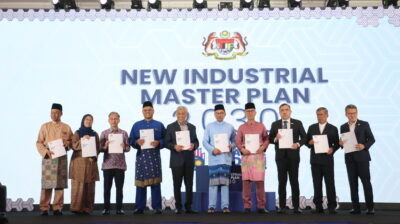

In a grand and transformative moment for Malaysia’s industrial landscape, the New Industrial Master Plan (NIMP) 2030 was unveiled on 1 September 2023, marking a significant milestone in the nation’s journey towards the MADANI Economy.
The NIMP 2030 is not merely a policy; it is a commitment to bolster the nation’s manufacturing sector, with ambitious microeconomic targets which include boosting the Gross Domestic Product (GDP) of the manufacturing sector by 6.5% annually. By 2030, this could translate into a substantial RM587.5 billion contribution to Malaysia’s total GDP.
The NIMP 2030 encompasses six (6) key goals that aim to elevate Malaysia’s economic standing:
The NIMP 2030 adopts a mission-based approach and outlines twenty-one (21) strategies and sixty-two (62) action plans across four (4) missions. These missions will collectively guide Malaysia’s industries toward technological advancement, sustainability, and deeper integration into the global value chain.
Four (4) pivotal enablers – financing, talent development, investor journey, and governance framework – act as the backbone of this transformation. These enablers will drive systemic and institutional reforms, ensuring effective implementation and creating an environment that supports industrial growth.
Nine (9) Mission-Based Projects (MBPs) will be the driving force behind the implementation of the NIMP 2030. These projects will catalyse high value-added activities across key sectors in Malaysia through initiatives such as launching a locally-manufactured electric vehicle (EV) and transforming 3,000 factories into smart factories by 2030.
Guided by the NIMP 2030, the Government is committed to nurturing high-value and innovation-driven sectors such as Electrical & Electronics (IC design and wafer fabrication activities), Specialty Chemicals, Aerospace, Pharmaceutical, and Medical Devices. The Government also targets four (4) additional growth sectors: Advanced Materials, Electric Vehicles (EV), Renewable Energy (RE), and Carbon Capture, Utilisation, and Storage (CCUS).
To provide substantial support, the Government proposes to allocate RM8.2 billion for the implementation of the NIMP 2030 Missions and Enablers from 2024 until 2030. The NIMP Strategic Co-Investment Fund (CoSIF) will be established to support the Mission-based Projects, while the NIMP Industrial Development Fund (NIDF) will be established to cover research, development commercialisation and innovation (RDCI), technology adoption, talent development, eco-industrial park development, and industrial cluster development.
In line with the NIMP 2030’s emphasis on inclusivity and balanced development, the plan aims to stimulate economic growth across all states by identifying new growth areas based on each state’s unique strengths. From mineral-rich states like Perak, Terengganu, Kedah, Pahang, and Kelantan to renewable energy hubs like Sabah and Sarawak, the potential of every state will be optimally harnessed. Malaysia’s existing key economic clusters will also be further expanded to create a positive spillover effect to neighbouring states through cluster linkages. For example, the Electrical & Electronics and Machinery & Equipment clusters in Pulau Pinang can create positive spillover effects for the northern corridor of Kedah and Perak, whereas the establishment of a new Electric Vehicle cluster in Tanjong Malim is set to further bolster Kedah’s automotive sector.
The NIMP 2030 is not just about economic growth; it is about empowering local players. The plan places a strong emphasis on enhancing Domestic Direct Investments (DDI), particularly from small and medium enterprises (SMEs).
The 2024 Budget announcement on 13 October 2023 earmarked an initial fund of RM200 million for the implementation of the NIMP 2030 programmes and initiatives. MIDA will assume an important role in executing the plan, providing support that spans all missions and enablers.
This visionary plan is more than just numbers and projections; it is a pledge to investors, both local and global, offering a clear vision of Malaysia’s future and its top priorities.